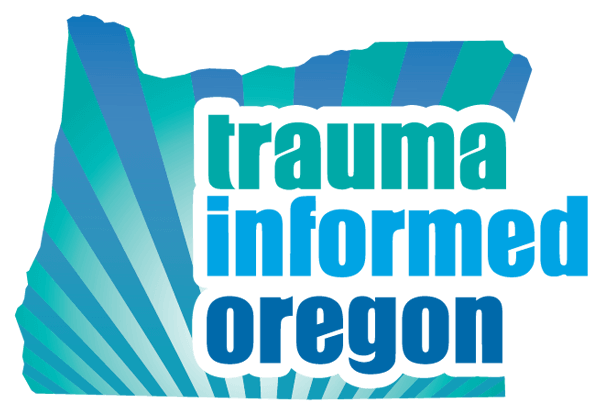Blog
 Loving So Deeply Freedom Follows
Loving So Deeply Freedom Follows

December 3, 2019
From Erin Fairchild, MSW, Violence Prevention & Interventions Systems Manager, Multnomah County Public Health Division: Prevention & Health Promotion
This October, I had the pleasure of attending the first statewide Trauma Informed Oregon conference in Sunriver. As I pulled in to the tree-lined driveway of where I was staying, I breathed deeper and felt a moment of gratitude to be in a quiet place full of life and open sky. The stars were already shining brighter.
Civil Rights leader Fannie Lou Hamer said, “Nobody’s free until everybody’s free,” and though my whiteness inevitably steers me off track as I unlearn the deeply ingrained habits of white supremacy that I was socialized into, these words are always my north star. I will always keep reaching. Nobody’s free until everybody’s free. Our liberation and healing must be collective, otherwise it’s just dominance disguised as empowerment. I know I am not alone in holding up this truth: when the most marginalized (historically and currently) among us are free to thrive, that will mean everyone is thriving.
As a member of Multnomah County’s Public Health Division, I find myself in the company of brilliant and passionate colleagues who teach me daily about the kinds of questions we should be asking as we work with our communities to improve health and well-being. Some of the inquiries include: How will this strategy benefit and uplift communities who have been the most harmed by systemic violence, interpersonal violence, trauma, and oppression? How will we center their expertise in crafting solutions based on their generative resilience and resistance? How will we shift power and resources? How will we challenge the status quo of dominance and supremacy thinking? How do we elevate the healing power of culture while dismantling oppressive norms?
For me, these critical questions ultimately mean, how will we be rooted in love so deep that everyone can see their freedom in it?
During my time at the conference, these questions were considered, held up to the light. Anita Davis with The Confederated Tribes of Warm Springs opened our time with beautiful song and prayer. I was grateful for this grounding and the centering of her voice in this space.
Another stand out session was led by Shilo George, trainer of Lush Kumtux Tumtum Consulting and colleagues she’s been working with at Metro Regional Government in Portland. My biggest takeaway from this powerful session is that moving slowly, intentionally, and relationally allows everyone to be their authentic self. And that’s critical when building trauma informed organizations—organizations that are dismantling the habits of supremacy thinking. Healing from trauma involves moving slowly enough to go deep enough.
The Culture as Healing Plenary left me inspired to be a co-conspirator in figuring out how to fund culture work as radical healing work. As a violence preventionist, I want to see access to diverse cultural traditions prioritized. Hearing from our Oregon legislators over a delicious lunch helped me realize how much progress we have made in addressing and preventing trauma in this state, and motivated me to keep working, to be an active part of the solution. Leslie Gregory, Founder and Physician Assistant at Right to Health, left me with the words to advocate clearly and strongly about racism as a public health emergency. The closing panel brought me back to this question: How will we be rooted in love so deep that everyone can see their freedom in it? Hearing from survivors of interpersonal violence and institutional violence about how they have navigated multi-layered trauma to healing, recovery, and fierce advocacy felt like the best way to wind down the conference.
It reminded me of Renee Mitchell and the youth who performed from her program, I Am M.O.R.E. Every person impacted by trauma is more than their pain, and that “more” part . . . that’s where the solutions live.
https://traumainformedoregon.org/wp-content/uploads/2019/12/Transforming-Public-Service-Culture-Through-TIC-scaled.jpg
Drawn by Up Your Creative Genius
https://traumainformedoregon.org/wp-content/uploads/2019/10/TIC-in-Oregon-Conference-Culture-as-Healing-Plenary.jpg
Drawn by Up Your Creative Genius
https://traumainformedoregon.org/wp-content/uploads/2019/12/Nothing-About-Me-Without-Me-scaled.jpg
Drawn by Up Your Creative Genius
The biggest takeaways for me are captured in the notes I took below:
 We must advocate for racism to be recognized as a public health emergency by health entities
We must advocate for racism to be recognized as a public health emergency by health entities- We need to slow down to transform systems; not rush through check boxes
- It’s not enough to transform systems; we must also dismantle oppression that exists as systemic violence
- We need to build workforce capacity to recognize and respond to trauma while ALSO advocating at the highest levels for policies that challenge injustice and right wrongs.
- Figure out how to fund culture as healing
- Center lived experience
As a survivor of trauma, I felt cared for and considered in this space. It is evident that the conference organizers thought about every detail. The use of art along the way to capture our learning with drawing was an amazing addition. The conference was trauma informed in practice, not just in theory. Having a healing and resting space specifically established for Black, Indigenous, People of Color should be present at every conference, and I was glad to see it here. It’s not a space for me, but I hope it was helpful for those who may have needed it.
Leaving the conference, I thought about the opportunity to see the stars under a different sky. I thought about my North Star—nobody’s free until everybody is free. I thanked Fannie Lou Hamer for her voice and vision, Trauma Informed Oregon for their commitment to healing and transformation, and my employer for sending me.
And then I thought, “let’s love each other so deeply that freedom follows.”

 We must advocate for racism to be recognized as a public health emergency by health entities
We must advocate for racism to be recognized as a public health emergency by health entities